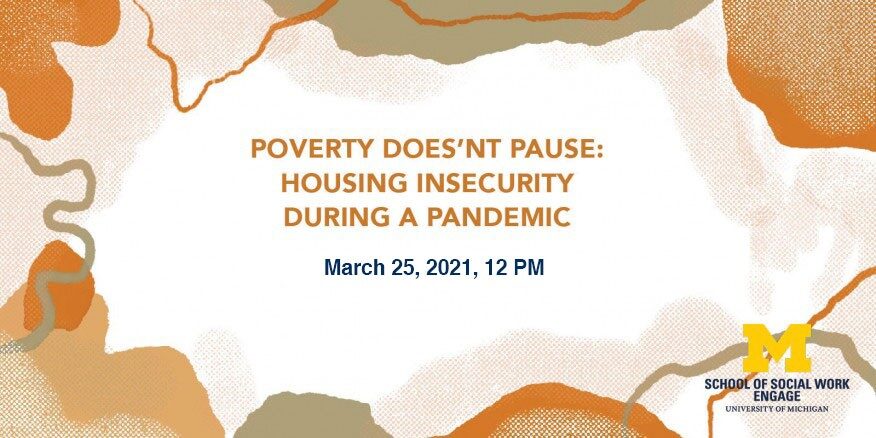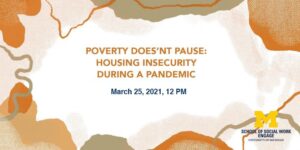
One in a series of virtual discussions hosted by the School of Social Work.

One in a series of virtual discussions hosted by the School of Social Work.
From the fight for a fair wage, to business closures during a pandemic, to a historic lack of job opportunities for Black individuals, race-based mechanisms of economic and social suppression have been systemically and strategically created in Detroit.
This week, a virtual discussion “The Movement for Economic Equity in Detroit” focused on the work of Detroit activists and leaders who have dedicated their lives to creating a more economically just city.
The discussion was part of the School of Social Work’s ENGAGE: Community series that began last year. Hosted by Ayesha Ghazi Edwin, ENGAGE Program Manager and adjunct lecturer, the discussions focus on equity issues in Detroit and movements for social change in the city.
They are free and open to the public and have featured speakers including thought leader and scholar Tawana Petty; Congresswoman Rashida Tlaib; lawyer and activist Deepa Iyer, among other prominent activists, scholars, and community leaders.
For Thursday’s discussion special guests included Eboni Taylor, Michigan executive director of Mothering Justice; DeWayne Wells, executive director of the Economic Justice Alliance of Michigan; and Alicia Farris, chief operations officer of the Restaurant Opportunities Center.
Ghazi Edwin designs the sessions and teaches a course that provides students with course credit for attending the sessions. Students in this course are from various schools on campus, and together they debrief, reflect and discuss how learning about these issues and social movements inform their understanding of inequity in Detroit and potentially inform their career and learning goals.
“The class itself has been really great for connecting students with local social movements for change. The sessions allow us to hear from multiple stakeholder perspectives on each issue, from professors to leaders of nonprofits to youth activists,” said Brooke Reiter, a Master’s of Social Work candidate. “I was especially appreciative to be able to learn from the youth organizers during these sessions; they bring a fresh set of eyes, personal experiences and contemporary propositions for systemic change to the table.”
And Ty Moreno, a Master’s of Social Work candidate, said: “Social work is a community informed profession and the ENGAGE sessions are bridging the gap between classroom concepts and the work being done in the real world. This course rightfully positions community members as the experts of their own experience and offers future practitioners like myself a way to connect with and learn from others on the front lines during a pandemic”.
The virtual discussions have also been done in collaboration with other units on campus, for example, the Ginsberg Center, the Michigan Medical School, among others.
Other upcoming virtual discussions are:
Poverty Doesn’t Pause: Housing Insecurity During a Pandemic
Thursday, March 25, 2021, 12-1:30 PM
Zoom link: https://umich.zoom.us/j/99081858926
Homelessness and housing insecurity have become an epidemic in our country, especially in communities of color. During a pandemic, these individuals end up being our most vulnerable. Join us for this virtual discussion featuring panelists working on the front lines of Detroit’s housing insecurity crisis, who will discuss how the pandemic has exacerbated housing issues. Featured panelists include LaTonia Walker, mobility coach of Creating Opportunities to Succeed (COTS); Amber Elliott, project manager and community improvement advisor for Built for Zero Nationals; Courtney Smith, executive director of Detroit Phoenix Center; and Candace Morgan, systems transformation advisor of Detroit’s Built for Zero, Community Solutions.
Immigrants in Michigan: The Untold Story
Thursday, April 1, 2021, 12-1:30 PM
Zoom link: https://umich.zoom.us/j/98088926254
Immigrants have made great contributions to this state–economically, politically, and socially. The fabric of American society has been woven by the contributions of diverse immigrants. And yet, as a nation, we continue to suppress and demonize these immigrants. This session explores the story of immigrants in Michigan, a story that we, as social workers, are obligated to know.
Special guests include Fayrouz Saad, executive director of the Office of Global Michigan; Wojciech Zolnowski, executive director of the International Institute; Fatou Seydi-Sarr, executive director and founder of the African Bureau for Immigrant and Social Affairs; and Laura Sanders, lecturer at the School of Social Work and founder of the Washtenaw Immigration Rights Coalition.
Storytelling for Social Justice
Thursday, April 8, 12-1:30 PM
Zoom link: https://umich.zoom.us/j/99312426479
Storytelling — listening to the stories of others and sharing one’s own stories — builds a foundation for human interaction. Telling others how we got here and why we care about an issue builds connection, allows us to share our values, and creates meaning. The art of public narrative is used in all aspects of social work practice — from helping our clients rewrite the stories they tell themselves, to helping communities and groups galvanize social change, to helping policy makers and politicians tell a “story of self” while creating a “story of us.”
Join us for a discussion featuring Aaron Foley, former chief storyteller for the city of Detroit and current professor of journalism at New York University; Eric Thomas, current chief storyteller for the city of Detroit; and Jessica Care Moore, Detroit poet, activist and author.

